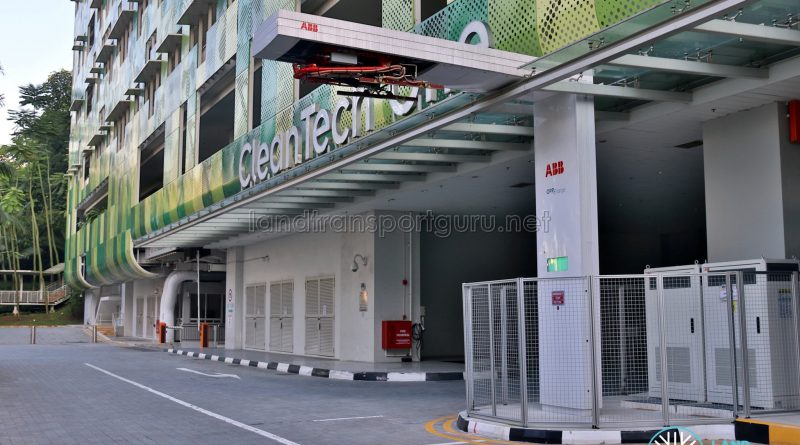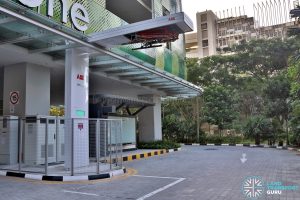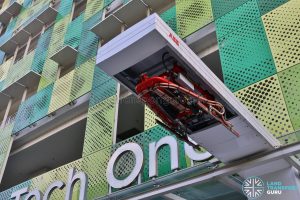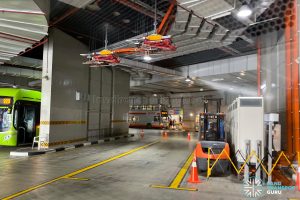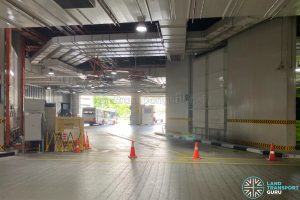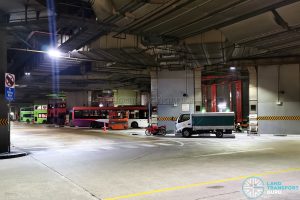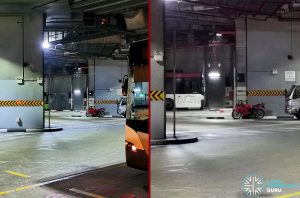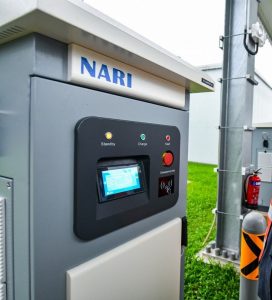See also: Installation of overhead bus chargers at Bedok and Bukit Panjang
Overhead pantograph charging will be used alongside conventional cable chargers when electric buses enter service in Singapore in 2020.
These details were revealed in a press release by Swiss-Swedish engineering group ABB, who was awarded a contract for the supply and installation of overhead pantograph chargers at bus interchanges (for ST Engineering supplied buses), as well as conventional cable chargers at a bus depot (for BYD buses). These chargers will support a combined 40 electric buses supplied by ST Engineering and BYD.
It is revealed that four overhead chargers will be installed at ‘key bus interchanges’, while ten cable chargers will be located at bus depots. The locations of overhead chargers were later identified as Bukit Panjang ITH and Bedok ITH (two each), and all 10 cable chargers were installed at Seletar Bus Depot.
| Tenderer | Electric Buses | Charging Mode |
| BYD (Singapore) Pte. Ltd. | 20 SD | Overnight Cable Charging (150 kW) |
| ST Engineering Land Systems | 20 SD | Overhead Pantograph (450 kW) |
| Yutong-NARI Consortium | 10 SD + 10 DD | Overnight Cable Charging |
| * SD = Single Deck Bus; DD = Double Deck Bus | ||
Chinese bus manufacturer Yutong, which won the tender under a consortium with Chinese electric power equipment supplier NARI, uses charging equipment supplied by the latter. Yutong is also known to prefer constant current DC charging for its electric vehicles.
NARI chargers for Yutong buses have been spotted at Bulim Bus Depot and Loyang Bus Depot. The number of chargers at each location has yet to be confirmed.
Background
As part of a trial to access the suitability of environmentally friendly buses in Singapore, the Land Transport Authority procured 50 diesel-hybrid buses and 60 battery-electric buses. All 50 diesel-hybrid buses (Volvo B5LH) have entered service in 2019, with 25 units allocated to SBS Transit and SMRT Buses respectively.
For the 60 electric buses, three firms were awarded the tender for 20 buses each, namely BYD, ST Engineering and Yutong-NARI Consortium. As part of tender requirements, tenderers were also required to provide the necessary charging infrastructure to support their fleets. It is now confirmed that both BYD and ST Engineering opted for ABB chargers.
Overhead charging — ST Engineering buses
The electric buses supplied by ST Engineering will be charged via overheard pantograph, based on the opportunity charging (OppCharge) platform.
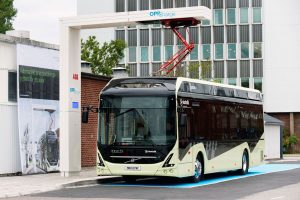
OppCharge is an open and competition-neutral interface seeking to accelerate the adoption of electric buses by being compatible with multiple bus manufacturers, hence offering operators choice and flexibility of buses without the need to modify existing charging infrastructure. These overhead pylon chargers with extendable pantographs are usually installed at the end stops of bus routes, allowing buses to quickly receive a full charge in-between trips.
Charging is fully automatic and secured by a two-way WiFi communication sequence. The driver gets a clear indication in order to stop within the specified ± 200 mm from the reference point. The charging sequence is started by activating the parking brake, and the driver can interrupt it at any time.
ABB’s scope of supply for ST Engineering’s 20 single-deck electric buses includes four 450 kW chargers with installation, civil works, project management and commissioning. These chargers would allow the electric buses to be quickly recharged in less than ten minutes at key interchanges with an automated rooftop connection.
ST Engineering is also known to be procuring electric drivetrain components from Linkker. Apart from selling whole buses, Linkker also manufacturers retrofit kits for other bus bodies, which mainly consists of the electric drivetrain and other peripheral equipment.
A similar overhead charger was installed at Cleantech Park in support of the NTU-LTA-Volvo Autonomous Bus Trial. The Volvo 7900 Electric bus participating in the trial is OppCharge-compatible and is recharged with the ABB HVC 300P fast-charge system, which delivers 300 kW DC power.
The ChargingPANTO downward-extending pantograph is supplied by Stemann-Technik.
Installation Locations
Two overhead pantograph chargers were each installed at Bukit Panjang Integrated Transport Hub and Bedok Integrated Transport Hub. These chargers are intended to support 20 electric buses brought in by ST Engineering and its retrofitted electric bus.
One adjacent lot at each interchange is sacrificed to accommodate the power cabinets and other associated power infrastructure.
Cable charging — BYD buses
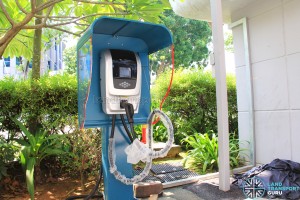
The electric buses supplied by BYD will use conventional cable chargers for overnight charging at bus depots. This method of charging is the most common for electric buses, and especially so in China, where buses manufactured for the domestic market are typically sized for a full day’s worth of operating range, and are then charged overnight.
For BYD, ABB will provide ten 150 kW overnight charging systems offering an intelligent and cost-effective solution to charge its fleet of 20 electric buses at night. Up to two electric buses can be connected and charged sequentially while parked at the depot, enabling all 20 buses to be fully charged and ready to run through the day within 4.5 hours.
Previously, a charging station was also supplied to Go-Ahead’s Loyang Bus Depot as part of the BYD K9 electric bus trial. Similar charging stations were installed to support the rollout of electric vehicle fleets, such as the BYD e6 taxi. Many more charging stations of different types are installed around Singapore to support the use of personal electric vehicles, as well as the BlueSG electric car-sharing service.
According to ABB, smart charging solutions from ABB incorporate a future-proof and modular design, safe and reliable operation and remote service and data management, and will pave the way for greener, more sustainable public transportation in Singapore.
Installation Locations
For the overnight charging of the Yutong E12 and Yutong E12DD buses, overnight chargers supplied by NARI have been installed at Bulim Bus Depot and Loyang Bus Depot.
For the overnight charging of the BYD K9 (Gemilang) buses, overnight chargers supplied by ABB have been installed at Seletar Bus Depot.
Video
See Also
- Electric Buses in Singapore
- Installation of overhead bus chargers at Bedok and Bukit Panjang
- 60 Electric Buses Procured by LTA
- Volvo Diesel Hybrid Buses procured by LTA
- Volvo 7900 Hybrid
External Links & References:
- LTA Awards Contract for 60 Electric Buses to Three Tenderers – LTA
- ABB to provide charging infrastructure for public e-buses in Singapore – ABB
- EV Charging – ABB
Back to Bus Articles
